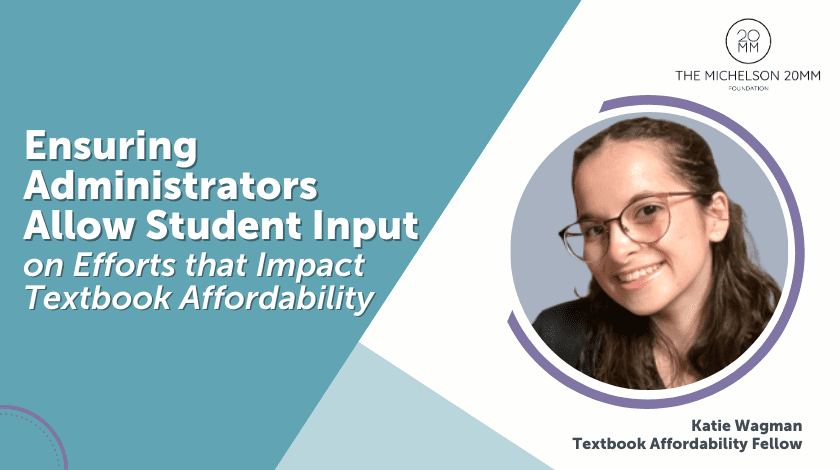News and Announcements
Ensuring Administrators Allow Student Input on Efforts that Impact Textbook Affordability
Published Date
- June 2, 2023

By Katie Wagman
As a first-generation college student from a lower income household, I know that every dollar counts. Even with government aid, college costs thousands of dollars and leaves most students in debt. Students should not also have to worry about another few hundred dollars every semester/quarter for textbooks and learning materials. Just this month, I walked into class and was shocked when the professor expected students to take out their credit cards and pay $100 right at that moment in order to obtain the access code for the course’s homework assignments. Students may have intended to use that money to pay for utilities or food, but instead they faced an unnecessary, unexpected, and unwarranted expense—students deserve an affordable education with full price transparency.
Students are the ones being affected by issues of textbook affordability, and so they need to be at the forefront of decision making. In fact, a 2020 report by US PIRG found that 25% of students had to work extra hours in order to afford class materials while 11% of students skipped meals for the same reason. Furthermore, PIRG found that 63% of students skipped buying or renting a textbook altogether, highlighting the fact that students are sacrificing both their resources and their education due to the high cost of textbooks.
At the University of California, Los Angeles (UCLA), and other UC campuses, the bookstore runs Inclusive Access programs. These programs function by automatically enrolling students and requiring that they opt out in order to not be charged. Inclusive Access programs, while used to negotiate with textbook publishers to save students money, give the illusion of choice without actually providing adequate information for students to make informed decisions all while simultaneously generating money for the publishers and campus bookstores. The contracts that the universities make with publishers for Inclusive Access are often not published for students to see, furthering the lack of transparency and fueling the concern that these programs are not benefiting students.
As these programs persist, the University of California Office of the President (UCOP) has put together a taskforce to look at the potential uses of Open Educational Resources (OER) in the University of California system. However, there is no student representative on the taskforce. OERs are a proven way to shift textbook systems toward affordable solutions, and students should be able to see the report and make changes to it so that it can serve them in the best possible way.
Over the next year, my fellowship projects will revolve around placing student representatives on the UCOP’s textbook affordability task force. I will also work to ensure that students are given an opportunity to share their opinion on UCLA’s current Inclusive Access program, as well as their concerns and goals for the future.
In order to obtain direct student input on the UCOP textbook affordability report and in UCLA’s Inclusive Access program, I am working to build a coalition of student groups, educate faculty on the issues of textbook affordability, and use grassroots organizing to show support for these goals. I am currently working with the Undergraduate Students Association Council (USAC) to unite student government representatives and various student organizations in their common goal of higher education accessibility. We are also running a survey for students to give their opinions on our current Inclusive Access program, as well as potential alternatives. The results of the survey will go directly to our campus bookstore so that we can adequately represent student interest. I will also work with faculty to make sure that they are aware of students’ struggles by presenting to the Academic Senate on the issues students are facing. Through public comments and letters of support, I will ensure that administrators allow student input on the proposals directly affecting their academic future.
I believe in a future that moves away from university systems that solely revolve around administrators who might be out of touch with student needs, and toward a system that includes and puts students at the center.
Michelson 20MM is a private, nonprofit foundation seeking to accelerate progress towards a more just world through grantmaking, operating programs, and impact investing. Co-chaired and funded by Alya and Gary Michelson, Michelson 20MM is part of the Michelson Philanthropies network of foundations.
To sign up for our newsletter, click here.